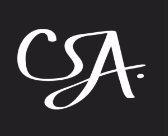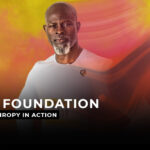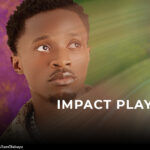With passionate energy and a unique flair, rapper, poet, and burgeoning style icon, Sho Madjozi, impresses on arrival. She is sure to conquerer 2018 and beyond, which is why you’ll see her included in the Top 50 African Next Gen influencers in On The Radar Volume 2
Words: Tshiamo Seape

Hello! How are you and what are you up to at the moment?
I’m currently working on new music and working on expanding the whole team. I’m working on making everything run crazy. Basically, it’s November so we’re training like athletes in the pre-season.
To fall right in, what does influence mean to you?
I think right now it’s a catch phrase that is being used a lot and unfortunately a lot of the time it refers to young black Africans using their young black Africaness to sell somebody else’s product or aesthetic. What I want it to mean is that we sell our own lifestyle. I want to influence the other young people to think about ‘what it actually means to be a young African right now’? If, as Africans, we were not interrupted by colonialism or Apartheid what would we be right now? Yes, globalised, yes modern, but I think a little bit more of ourselves in our everyday life. What I try and explore in my hair and in my looks is what young African look like right now. That’s what we are trying to push.
If I can say, “now we can wear Xibelani at a mainstream event” and other girls see that and say “that’s dope” – that’s influential.
You want your audience to walk away with a confidence in their own culture?
I’m actually not about preservation of culture just for the sake of it. All those terms make me feel really bored because they keep us stuck in the old fashioned sense of being African, which is why we only wear our traditional clothes on Heritage Day. I’m interested in seeing what culture looks like now; what it looks like practically, and what it looks like at the club! Reimagine yourself. Don’t just take what they say you look like as what you look like – really imagine yourself for yourself.
I remember going onstage and people went crazy. It also gave me the confidence in knowing, “shit, we actually do like to see ourselves represented”
One of the highlights of your year was performing at Major League DJz’s Gardens Festival. Who among your fellow performers do you think has the biggest game right now?
In the entertainment sphere, there’s no question that Gemini Major is extremely influential. There are very few tracks – hits, in fact, you’ll hear that don’t have Gemini’s hand in it from Hip-Hop to Afro Beat to Reggae. Another one is DJ Maphorisa. Again, there are very few house tracks you’ll hear that don’t have his hand in it. So, when you talk about influencing the culture any one of those two guys will have several tracks in the top 10.
What did you personally take away from that event?
I got such an immense response from the people. I remember going onstage and people went crazy. It also gave me the confidence of knowing, “shit, we actually do like to see ourselves represented”.

How long have you been rapping and what was the catalyst for you to start?
Brokeness. Brokeness is the mother of invention. I had no money and I’m trained as a writer so I thought, “no man, I can write for money, one of the things I know I can write is raps”. But, I didn’t picture myself as a rapper, I was only going to be a ghostwriter. So, I hit up one of my faves, Okmalumkoolkat, who thought I wanted to rap and when he heard my flows he was like “that’s too crazy, you have to rap for yourself”, so my first feature was on Mlazi Milano which came out in December last year. From there it’s just grown at such a rapid rate and it’s been really exciting and I think inspiring for a lot of people.
You write a lot of poetry. I want to know what part of rapping fulfils a creative expression that poetry does not?
I love poetry and I’ll forever write poems, but I do it for me, to heal myself. I think I would’ve died a long time ago if I wasn’t a poet. When it comes to rapping, I feel like I want to do it more for the people. I can say a lot of good things about poetry and I’m the first person to say it, but it is elitist. Most poetry that you hear in this country or read in this country is going to be in English, but most people from my village don’t read or speak English. I want people to realise that this [rapping] is also something they can do and that they can proudly be Tsonga and be represented in mainstream culture. That’s something poetry couldn’t do.
You are such a vibrant artist and you’re brimming with confidence, where does this come from?
I realised at some point a couple of years ago there’s really no point in being embarrassed. Everybody is just trying to do the best they can to survive. You just have to kind of go for it. I also wasn’t this confident in the beginning, but then you do it and then you just realise there’s nothing standing in the way of you and what you are doing. I just keep trying stuff. TV? Cool, I’m gonna try that, and it works.You try this, you try that; you rap on gqom, and that works. I think the only thing that prevented me from being a rapper is that I never tried to be a rapper before. Another thing that’s really important for young people, in general, is to realise that a lot of the time all it takes is skill, learning and studying. Whatever you want to do, learn from people. You don’t even have to go to school just try and study people.
See the full list of Africa’s next-gen Influencer On the Radar Vol.2
You studied in the U.S. What was the biggest lesson you learnt from being abroad?
That it’s all over that side. Places like the U.S., and recently Europe, are no longer at their peak – they’re done and it’s our time. When you look at what those artists are doing, they’re all looking at us, and now the biggest Afro Beat songs come from Drake
People have already seen how Okmalumkoolkat sees me, how DJ Maphorisa thinks I should sound, how Khuli Chana thinks I fit into music, but they haven’t seen what Sho Madjozi would do if it was just Sho Madjozi
I understand you were recently in Ghana. What was that like, and what were you up to?
Non-disclosure agreement [laughs]. But, this isn’t my first time in Ghana. I’ve done three songs with Ghanian artists. The previous time I was there I was shooting a music video with Wanlov The Kubolor for our song called “No Borders”, but I’ve always been about that travelling life. When I was 16 my dad got a job in Tanzania and so our family relocated there and at that time South Africa was very closed to other African countries and if I didn’t go I would have grown up thinking that South Africa is the world.

Which African artists are on your Radar?
There is a Ghanian artist called one Worlasi. The thing is that each country has its own scene, so there are artists who are big in Tanzania but not on the rest of the continent like this guy called Rayvanny: he’s this brilliant writer and singer and his music is so cool, and I wish I could work with him at some point.
What can we expect from you in the future?
Obviously, my album is coming out and it’ll be out next year, people are gonna see me for the first time. People have already seen how Okmalumkoolkat sees me, how DJ Maphorisa thinks I should sound, how Khuli Chana thinks I fit into music, but they haven’t seen what Sho Madjozi would do if it was just Sho Madjozi, and I think people will be quite surprised. It’s definitely something extremely different. I really want to focus on music because I’ve been doing a lot of TV stuff this year and I want to bring it back to the music and expand it to the continent. In the short term, you can also expect some very interesting brand collaborations. I think people are just gonna see me coming to my own and less of me being like, ”what, I’m famous”? I’m being more like, “okay shap, now let’s work, let’s go”.
See the full On the Radar Report here
For more, you can follow Sho Madjozi on Instagram and Twitter
Get in touch to find out more about our inlfuencers or celebrity booking needs.





